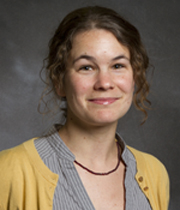Cottrell Grant to Aid Materials Science Research
July 20, 2012Assistant Professor of Physics Sharon Gerbode has received a Cottrell College Science Award from the Research Corporation for Science Advancement in support of materials science research.
The two-year, $35,000 grant will fund efforts to solve a physics mystery, which may help point the way to the creation of more efficient solar cells.
Pure crystalline materials are needed to make technologies such as microprocessor chips and solar cells more efficient. Since most crystals contain a small amount of at least one other element, they must first be processed to expel the unwanted atoms. Current methods involve heating and cooling crystals until the impurities shift to the surface, where they can be removed by mechanically grinding or chemically etching them off.
This technique, however, does not work when applied to spherical silicon, an exciting new candidate photovoltaic material, said Gerbode.
“Existing theoretical models that describe how impurities are expelled from silicon crystals cannot explain the resistance of aluminum impurities to such traditional heating and cooling techniques,” she said. “The small size and fast motion of atoms prevent direct experimental observation of aluminum impurity expulsion in spherical silicon, ultimately limiting its potential efficiency for solar cell applications.”
Gerbode’s project, “Particle-scale Dynamics of Impurity Expulsion in Colloidal Crystals,” aims to quantify the process by which impurities are expelled from colloidal crystals, which can be directly observed using an optical microscope.
Students working on the project will learn about fundamental problems in statistical mechanics, view impurity motion in action and—using combined techniques from physics, materials science and optics—will build an invisible infrared laser tweezer system that can be used to manipulate colloidal impurity particles within the crystals.
Colloids consist of microscopic solid particles suspended in liquid. One micron in size—about one hundredth the thickness of a human hair—the tiny particles move randomly about from the motion of the liquid molecules. When densely packed, the random motion causes the particles to order into a crystalline structure.
“We will introduce larger impurity particles that do not fit into the crystal lattice and record a movie of the resulting particle motions in real time using an optical microscope,” Gerbode said. “By revealing an unprecedented particle-scale view of the physical mechanisms of impurity expulsion, our results will address a fundamental physics question and are expected to contribute to solving outstanding problems in materials science.”
An experimental physicist who studies soft-matter physics, Gerbode joined the Harvey Mudd College faculty in January, following a postdoctoral fellowship at Harvard. She earned her doctorate in physics from Cornell University in 2010.
Established in 1912 by Frederick Gardner Cottrell, a professor of physical chemistry at the University of California-Berkeley, the Research Corporation for Science Advancement is the nation’s oldest private philanthropy dedicated to scientific research. The Cottrell College Science Awards promote basic research by early career faculty at primarily undergraduate institutions.

